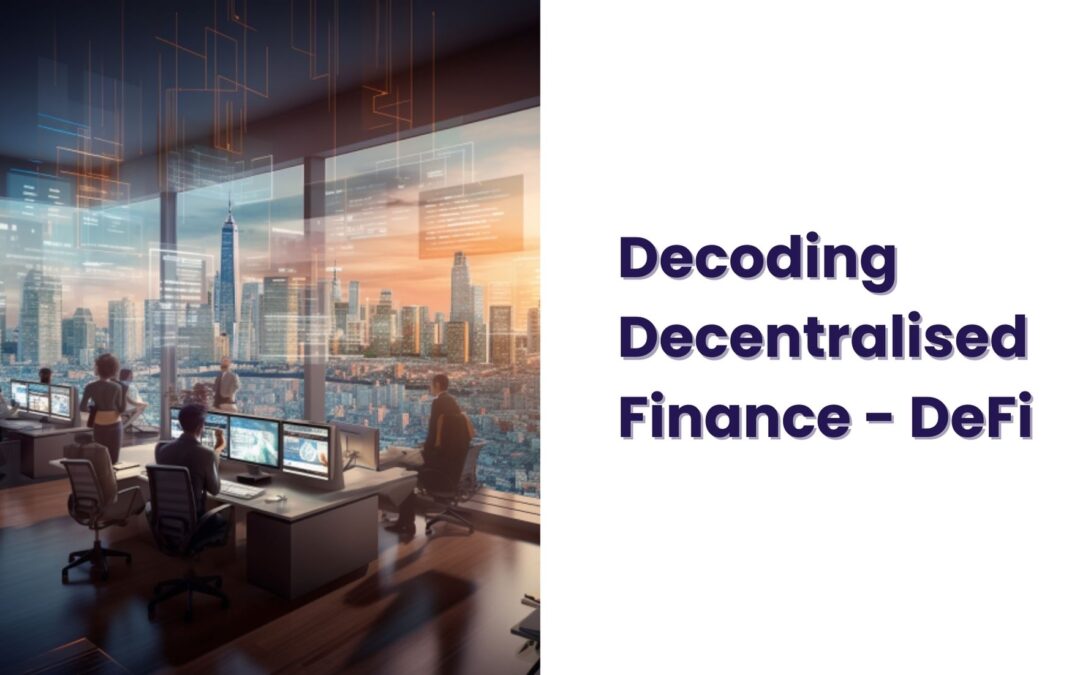In the ever-evolving landscape of finance, a revolutionary concept has taken center stage — Decentralized Finance (DeFi). Let’s embark on a journey to explore the ins and outs of this groundbreaking financial paradigm that is reshaping the way we think about traditional banking.
Are you someone who is looking for an amazing place to save money in? Here’s your chance to save money in 24k digital gold – download the Jar App now.
Understanding the Essence of Decentralized Finance – DeFi
There are several upcoming financial trends that are truly grounbreaking. One of them is decentralised finance.
Breaking Down the Basics
Decentralized Finance is not just a buzzword; it’s a game-changer. Unlike conventional financial systems, DeFi operates on a decentralized blockchain, offering a plethora of financial services without the need for intermediaries.
The Core Pillars of DeFi
In the world of DeFi, users have direct control over their assets, thanks to smart contracts that execute transactions automatically. This eliminates the need for banks or other centralized authorities, providing users with unprecedented financial autonomy.
Why DeFi Matters: Unveiling the Advantages
Financial Inclusion at its Core
One of the most compelling aspects of DeFi is its commitment to financial inclusion. By removing the barriers set by traditional banking systems, DeFi opens up financial services to the unbanked and underbanked, fostering a more inclusive global economy.
Enhanced Security through Blockchain
Blockchain, the technology behind DeFi, ensures transparency and security. Every transaction is recorded on an immutable ledger, making it resistant to fraud and hacking. This heightened security is a breath of fresh air in an era plagued by cyber threats.
Navigating the DeFi Landscape: Key Components
Decentralized Exchanges (DEX)
In the realm of DeFi, traditional exchanges take a backseat. DEX platforms facilitate peer-to-peer trading without the need for a central authority. This not only ensures quicker transactions but also minimizes the risk of manipulation.
DeFi – Yield Farming: Maximizing Returns
Yield farming has become a focal point in the DeFi space. Users can earn passive income by providing liquidity to various decentralized platforms. This innovative approach to farming yields has caught the attention of investors seeking higher returns on their digital assets.
Overcoming Challenges: The Future of DeFi
Regulatory Hurdles
As DeFi gains momentum, regulatory challenges are inevitable. Striking a balance between innovation and compliance is crucial for the sustainable growth of decentralized finance. Industry leaders and regulators must collaborate to create a framework that fosters innovation while protecting users.
Scalability Concerns
While the potential of DeFi is vast, scalability remains a concern. As more users join the ecosystem, the demand for efficient and scalable solutions becomes paramount. The industry must address these challenges to ensure the continued success of decentralized finance.
Embracing the Future: The Rise of DeFi
In conclusion, Decentralized Finance is not just a passing trend; it’s a seismic shift in the financial landscape. With its promise of inclusivity, security, and innovation, DeFi is set to redefine the way we engage with our finances.
FAQs
What is Decentralized Finance (DeFi), and how does it differ from traditional finance?
Decentralized Finance, or DeFi, operates on blockchain technology, eliminating the need for intermediaries like banks. Unlike traditional finance, DeFi provides users with direct control over their assets through smart contracts, fostering a more decentralized and transparent financial ecosystem.
How does Yield Farming work in the context of Decentralized Finance?
Yield farming involves users providing liquidity to decentralized platforms, earning passive income in return. By staking their digital assets, users contribute to the liquidity pool, enabling decentralized exchanges to facilitate transactions. This innovative approach has become a popular way for investors to maximize returns in the DeFi space.
What are the primary security features of Decentralized Finance, and how does blockchain contribute to its safety?
Blockchain, the underlying technology of DeFi, ensures security through transparency and immutability. Every transaction is recorded on a tamper-proof ledger, reducing the risk of fraud and hacking. This heightened security is a key advantage of DeFi compared to traditional financial systems.
How does Decentralized Exchange (DEX) differ from traditional exchanges, and what benefits does it offer?
Decentralized Exchanges operate without a central authority, enabling peer-to-peer trading. Unlike traditional exchanges, DEX platforms provide users with greater control over their funds and faster transaction processing. This decentralized approach minimizes the risk of manipulation and enhances overall trading efficiency.
What challenges does Decentralized Finance face, particularly in terms of regulation and scalability?
Regulatory hurdles and scalability concerns are two major challenges facing DeFi. Regulatory frameworks need to strike a balance between fostering innovation and ensuring compliance. Additionally, as more users join the DeFi ecosystem, addressing scalability issues becomes crucial for sustainable growth and widespread adoption.

